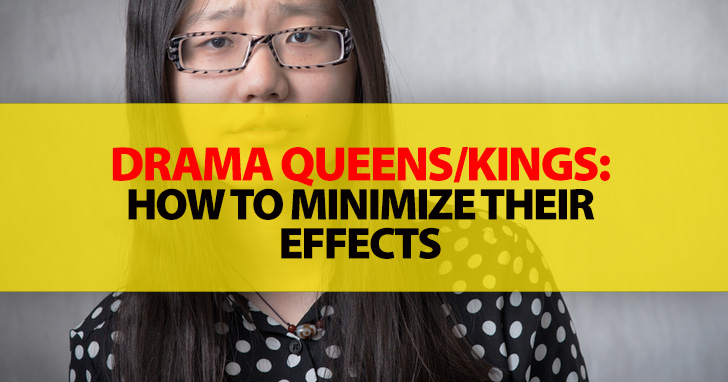10 Methods to Incorporate Drama in the ESL Classroom


Or the drama queen or king may actively create crisis. In life outside the classroom, these crises are often real ones, involving job loss, bankruptcy, or criminal offenses. In the classroom, the emergencies tend to be smaller, at most unsubstantiated reports of cheating or other offenses committed by classmates; however, they remain a major drain of time and energy.
There are a number of puzzling reasons for the drama addict to engage in such destructive behavior, of blowing up minor concerns or creating major ones. Upon further examination, the biggest motivation is probably control. By creating the drama, the master of it gets everyone’s immediate focus in dealing with the crisis and creates a situation she or he has unique qualifications to manage, having long experience in such crises and agency in this one in particular.
Whatever the reason, however, as in life in general, steps must be taken within the classroom to minimize or even extinguish the drama master’s effects if not the behavior itself.

Ask critical questions. How important is this right now? What do you want me to do about it? What actually can be done about it? This gets the student focused on solutions rather than the drama itself or may even lead to a concession that the issue isn’t really an issue.
“I can’t address the wastepaper problem right now, and am not actually motivated to, as I’m setting up for class, but will do so at break.” This gets the student to put the issue in perspective and consider effects of the behavior on others.
“I’m sorry you are so distressed over the loss of five points. If you arrive on time, then you will not lose points.” This will strip away the drama master’s illusion of control, that he or she can make the loss of points the focus of immediate attention, and places the control back where it belongs, on what he or she can control—his or her behavior.
A large part of a drama queen’s power is an audience—hence the “drama” portion “drama queen.” However, drama isn’t really drama without an audience, and the audience is indeed part of the drama master’s control, especially if more players can be pulled in. “Well, maybe the wastepaper basket isn’t important to you, Ms. Baker, but it is to the rest of us. Hey, class, how many of you agree with me? Isn’t the waste paper basket…” etc. Remove the audience and pull the drama queen into a private discussion in your office or after class. It is more difficult to be dramatic in a small space before an audience of one. In addition, the instructor can help the drama master save face: “I’m sorry that X has caused you anxiety. Can you explain what the problem is, exactly, that is creating such concern and what can be done about it?” This kind of isolating and direct questioning forces the drama king or queen into demonstrating there is an actual crisis by giving specifics about it without embarrassing him or her in front of peers, which will compound the problem. The lack of a larger forum also allows the issue to die a natural death because the motivation in keeping it alive also dies.
People like the drama queen who are used to being in control naturally are threatened by the loss of that control. Therefore, they may lash out and become even more dramatic than usual. Be prepared for adult tantrums; acknowledge the feelings behind the outburst, but stand firm on your boundaries: e.g., “I’m sorry you are so upset, but as I’ve mentioned before, I cannot take up class time with this. Please take a seat and speak to me after class.”
Drama queens often have a limited set of boundaries. It is the instructor’s job, ultimately, to worry about the classroom environment, other students’ classroom manners, and overall, how class time will be structured. Point out gently to the drama master when she has transgressed one of these boundaries: “Thank you for your concern, Abigail, and I’ll certainly look into this matter of Jenny’s use of Facebook during the lecture. Meanwhile, please focus your energies on your own grade and doing well in the class.” This is actually correct: other students’ behavior is the instructor’s problem unless it directly impacts the drama queen, and the individual student’s main responsibility is her own success. Again, be prepared for outbursts, insistence that she is addressing the concern because you aren’t doing your job, and so forth. Stand firm by repeating the expectation the drama queen remove herself from this matter and focus her energies elsewhere. This reinforces your respective roles and boundaries.
As a last resort, if the drama master becomes so disruptive that he impedes classroom instruction, consider meeting with him and the dean. The drama master may actually preempt you in this move if you are not responsive to the effort to disrupt the class with his antics. Remain calm during the meeting, stay factual: e.g., that the drama king repeatedly interrupts lectures, argues with you and other students, and in general takes up class time. If you have documented the behavior, such as notes of specific incidents on specific dates, this can also help. In addition, a drama master might well have created her own paper trail in a series of argumentative or hostile emails to you. She may have even copied the dean or other administrators because of her conviction in the rightness of her actions and the degree of offense that has been directed at her. All of this serves the purpose of demonstrating inappropriate behavior on her, not your, part, especially if you have remained coolly professional in the face of her drama. The situation, however, rarely evolves this far. More commonly, the drama queen by her very nature finds it difficult to sustain a drama you are largely not entertained by and unresponsive to and takes her act elsewhere, usually by dropping the class.
Drama masters, because of their need for attention, can be among the most challenging students to deal with.
However, by remaining professional, sticking with facts, and redirecting the attention of the drama master to more productive uses than creating crises, the instructor can limit the negative energy of the drama master and even channel it in more productive uses.
How do you address them?